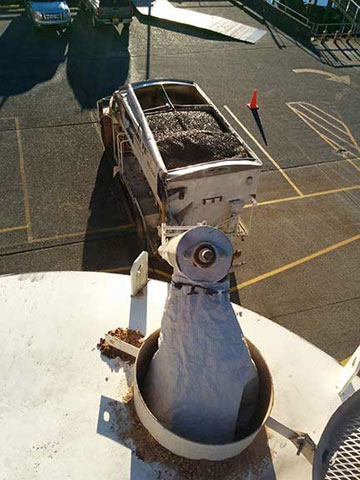
Shifting to heating with renewable wood byproducts
March 13, 2014
One of the priorities of the Tongass National Forest is to promote economic development and address climate change by shifting the energy economies of Southeast communities from heating with fossil fuels to heating with regionally sourced renewable energy, specifically biomass energy in the form of wood pellets. Biomass is biologically derived renewable material. The woody biomass found in abundance in Southeast Alaska represents a significant energy resource for local communities such as Ketchikan. The future of timber management on the Tongass is in young growth forestry. Wood byproducts from restoration and young growth management could be utilized as an energy resource, displacing fossil fuel and reducing energy costs. One of the projects that has been using wood byproducts is the U.S. General Services Administration’s Ketchikan Federal Building and U.S. Courthouse. As part of the agency’s Green Proving Ground program, GSA replaced the building’s outdated, inefficient 1964 steam heating system withan energy efficient hydronic heating system that includes one biomass boiler and one high-efficiency oil-fired boiler that will serve as a back-up. GSA has been running both the high-efficiency oil and biomass boiler to test the efficiency and effectiveness of biomass to heat the federal office building, and use that information to improve the efficiency of all GSA-managed facilities. GSA expects to reduce fuel oil consumption at the building by approximately 50 percent annually. The Ketchikan Federal Building, the first United States federal building to have a biomass boiler installed,historically burned up to 9,000 gallons of fuel oil each year. Jim Langlois, GSA Property Manager, estimates the federal cost of pellets currently equates to federal oil cost at $2.15 per gallon. A report on the efficiency, cost-effectiveness, and operational functionality of the Ketchikan biomass boiler will be finalized this year. The pellets GSA began using last fall are produced locally in Ketchikan by Tongass Forest Enterprises from sawmill residues that used to be disposed of as a waste product. “Utilizing wood pellets increases manufacturing efficiency by utilizing wood milling residues," said Larry Jackson, Plant Manager for Tongass Forest Enterprises. “It reduces importing of heating fuel, saves the tax payer money on heating public buildings, adds jobs to the local economy, and diversifies the energy supply of the region.” In 2013, the Ketchikan Gateway Borough received Forest Service grants of $143,363 for both Ketchikan High School and the Ketchikan airport terminal to fund the design for conversion of the heating systems from heating oil to biomass fuel. Additionally, an Alaska Renewable Energy Fund grant for $620,000 was recommended for approval by the Legislature to help pay for the construction of the Ketchikan Airport Terminal conversion. The new Ketchikan Library was constructed using an advanced pellet boiler for heating. The money saved by the larger facilities converting from oil to pellets also remains in the Ketchikan economy. The Forest Service goal over the next decade is to support a transition of 30 percent of the regional heating oil usage to biomass energy. Wood pellets can also be utilized as a home heating solution by installing a home pellet stove. Electricity is required for a pellet stove to function and heating can be disrupted during any power outages. Production of eco-logs for home wood stoves and fireplaces is another biomass industry that is growing in popularity around the country. Eco Logs are an all wood product created from clean, dry sawdust and shavings that are mechanically compressed to form a solid log. These logs utilize waste material that would otherwise be going to a landfill or burned in an uncontrolled manner. Currently there are no industries in Southeast Alaska producting these earth friendly logs for home wood stove use. However, these logs are shipped up and can be purchased in Ketchikan at Madison Lumber and Hardware.
E-mail your news &
photos to editor@sitnews.us
|
|||
